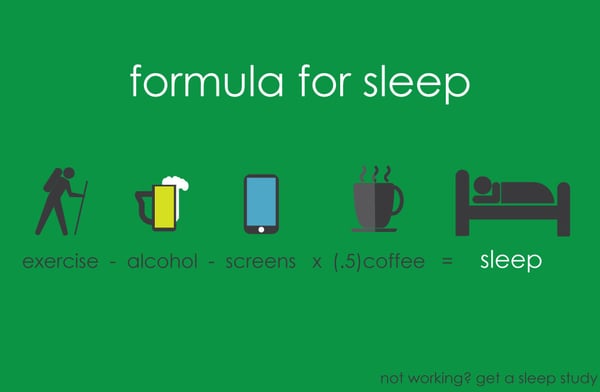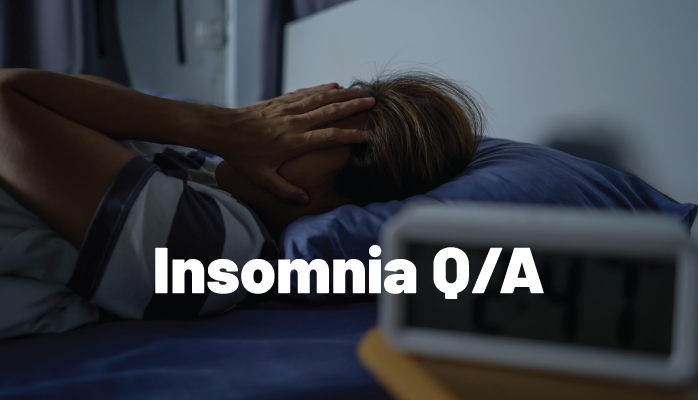How Does Insomnia Interfere With Life?
Insomnia is a sleep disorder that leaves you sleep deprived and frustrated. Insomnia is a condition when you either can’t fall asleep, can’t stay asleep, or always wake up far earlier than you need. The result of insomnia is mild to severe sleep deprivation, which can have mild to catastrophic consequences.
Insomnia side effects interfere with all aspects of life, including our health in terms of:
- Emotionally
- Cognitively
- Physically
- Socially
Understanding what insomnia is and what you can do to help treat it may dramatically improve your well being.
Is There only One Type of Insomnia?
Insomnia is not quite as straight forward as you might think - there's actually two types of insomnia, and there are also two modes of insomnia. Hence there are four possible combinations that best characterize your insomnia.
The two types of insomnia are:
- Primary insomnia – insomnia as a direct result of something else
- Secondary insomnia – insomnia with no clear, underlying issue
The two modes of insomnia are:
- Acute insomnia – short term, a month or less
- Chronic insomnia – symptomatic, long term (at least three times per week for a month or more)
If you are trying to identify insomnia, it would be helpful to identify whether or not your sleep problems are:
- Recent or chronic, and
- Whether or not you know a clear reason that is preventing your sleep
What are Common Causes of Insomnia?
Short-term insomnia ("acute") is usually caused in response to temporary and external factors such as:
- Short term illness
- Jet lag
- Switching shifts at work
- Temporary regimens of medication
- Travel
- Significant stress (divorce, job loss, death of loved one, moving)
Acute insomnia usually clears up once the external cause goes away. Even if there is no discernible cause for your short term insomnia, it still may clear up on its own. Of course, it may also develop into long term, chronic insomnia depending on the context.
Causes of chronic, long-term insomnia include things like:
- Age-related sleep changes
- Chronic stress
- Chronic anxiety
- Depression
- Chronic pain
- Circadian rhythm disorders
- Dependence on certain medications
- Habitual life style choices
- Chronic substance abuse
- Especially in Alaska, seasonal effects or transitions (light/dark extremes)
- Other sleep disorders
What are Most Common Insomnia Risk Factors?
Another helpful tool for helping evaluate whether or not you have insomnia is understanding the risk factors for developing it.
Probably the most common factor for chronic insomnia with no identifiable cause is simply aging. People over 65 are significantly more likely to report insomnia. This happens because of natural biological changes that take place as we age. Secondly, it’s also more common in women than men.
Here is a fairly extensive risk of other risk factors associated with developing insomnia:
Diseases as Risk Factors
Many diseases can affect our ability to sleep, and make us at risk for developing insomnia:
- Diabetes
- Kidney disease
- Lung disease
- Arthritis
- Heart disease
- Heavy smoking
- Sleep apnea
- Restless leg syndrome (RLS)
- Addiction
- Parkinson’s disease
- Alzheimer’s disease
- Mental disease
Medical Complications as Risk Factors
Other medical reasons also cause. Certain medications cause insomnia (primary) as a side effect, and include:
- Diet pills
- Steroids
- High blood pressure medications
- Theophylline
- Phenytoin
- Levadopa
- Decongestants
Psychological Risk Factors
Psychological factors are some of the most common root factors for developing primary insomnia, and include:
- Depression
- Anxiety
- Stress from marriage/job/health issues
Lifestyle Risk Factors for Developing Insomnia
 Things like too much alcohol, excessive coffee drinking, and too much screen time can influence insomnia
Things like too much alcohol, excessive coffee drinking, and too much screen time can influence insomnia
Lastly, insomnia is also commonly caused by lifestyle choices that make sleep difficult, such as:
- Shift work
- Poor pre-sleep habits (screens, diet)
- Drinking before bed
- Drinking too much coffee
- Jet lag
- Poor sleep environment – noisy, bright, distractions, etc.
- Exercising close to bed time
How is Insomnia Treated?
Finally, the question you might be thinking if you have insomnia is: what do I do?
Insomnia should be treated differently depending on what type of insomnia you have. Acute insomnia will likely go away on its own. Chronic insomnia treatments may be a little less straightforward, and will likely require some intervention of some sort. This often starts with behavioral therapy, such as:
- Therapy
- Education on good sleep habits
- Lifestyle changes
- Ways to reduce severity of chronic causes (such as pain treatment)
- Avoiding screens before bedtime
Over the counter pills are usually not recommended because they may have undesired side effects and lose their effectiveness over time.
Treating insomnia will likely require direct consultation with your doctor or a sleep specialist, and may require trial and error to narrow down possible causes and best treatment options. If you live in Alaska and are worried that you are struggling with insomnia, please contact one of our sleep specialists.


